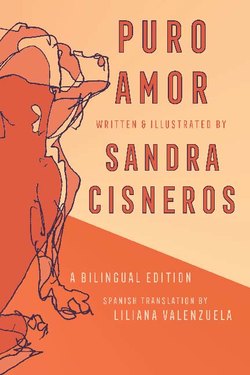Читать книгу Puro Amor - Sandra Cisneros - Страница 7
На сайте Литреса книга снята с продажи.
ОглавлениеMrs. de Rivera fed the animals in the courtyard as soon as she got up. They made an awful racket, her animals, especially on the days she most wanted to sleep in, when her back bothered her. During the summer, the season of afternoon rain, the animals misbehaved the most, and on rainy days her bones misbehaved as well.
The neighbors claimed Mister and Missus had as many animals as if they were from a ranch. And the animals claimed the same. This was not a compliment coming from people, but the animals were more generous and civilized and saw things differently.
The animals were only a part of a long list of Mister and Missus’s eccentricities. The way they lived, for example, with poor people’s furniture when they could’ve well afforded better. The light fixtures in their rooms, ugly naked bulbs dangling from dusty cords. The outside walls of their house painted a gaudy cobalt blue, a hue so bizarre everyone in the colonia knew the address simply by saying “la casa azul.”
Mister, after all, was an artist known across the republic and beyond. A circus of admirers arrived at all hours and left at all hours singing in Russian, Chinese, English, and French. Sometimes gunshots were heard, for it was well known in all of Coyoacán that Mister liked nothing better than to fire his pistol in the air when he was feeling content after his mescal.
And that was not all. ¡Ay, no! It was a fact the Mister and Missus were not believers. They lived dissolute lives. Hollywood starlets, the wives of millionaires, as well as the mistresses of powerful politicians posed for their portrait naked in front of the Mister. And this with the Missus’s knowledge and approval. A barbarity!
Oddest of all, Mister and Missus had no children, though they were well into middle age. This was why they could indulge and over-indulge themselves with animals. More than some thought healthy.
Some animalitos were rescued from the streets because they looked, to Mr. Rivera’s eyes, like ancient Olmec pottery. Some were abandoned on their doorstep with flaccid bellies after giving the world too many gifts. Some Mister and Missus had given to each other, and some Missus fell in love with in secret, on excursions into the countryside, scooping them up and helping them into the car herself when her husband wasn’t looking; he was jealous. These Mrs. de Rivera loved the most, because their eyes were filled with grief.
Among the animals living in the household was a bad-tempered guacamayo—a passionate, possessive macaw, who flew into rages, scattering seed cups and upsetting his water, cursing in several languages.
There were the six hairless dogs who waited patiently for Missus to rise before beginning their day, warming her back, radiating heat like meteorites, and when she moved, their intelligent heads alert, their ears fluttering gently like the wings of a butterfly, greeting her always with infinite joy.
Cats—there were several varieties, feral as well as tame. One as fat as a Buddha, one as elegant as a carved Egyptian, one who looked like a dirty bath mat, and one who repeated all day, “Me, me, me, me.”
There was a little fawn who tap-tapped her way throughout the house like a blind woman, ears and nose swallowing air, a lovely creature with a silvery coat flecked with hail. And there were, at various times, many others, elegant and inelegant, some adoring and some indifferent, who shared their residence with the Mister and Missus. Tempestuous monkeys, nervous tarantulas, lethargic iguanas, and on occasion, most troublesome of all, orchids, as imperious and spoiled as an emperor’s favorite courtesan.
The animals consumed more than food. They devoured Mrs. de Rivera’s attention from the moment she opened her eyes. Even before she opened her eyes. The dogs pawed and rubbed themselves on her belly and spine. They slept on her starched pillow embroidered in silk thread—“Amor Eterno.” They brought dirt into her bed, nosed their way under the blankets, curled themselves in the nook behind the knees, the swell of her stomach, the soles of her feet. They insisted and insisted. And when she locked her bedroom door, they scratched and pawed and pleaded, destroying the wood with their urgent devotion, peeling the paint from the doors, swatting and rattling the doorknobs, hobbling and then dodging the servants’ brooms, and kneeling outside her door like the adoring Magi before the just-born Christ.
When she had been well, Missus cooked her husband’s favorite meals and brought them to him in a basket wrapped with embroidered dish towels and bougainvillea blossoms, and sometimes wrapped the desserts in banana leaves. “You Are My Sky,” the dishcloth said. She had embroidered it herself. The meal was her handiwork as well.
On occasion Mrs. de Rivera picked up a pencil or paintbrush and ventured to draw pictures of her life, because she was the subject she knew best. The señora liked to make things. Embroidery. Sewing. Baking. Gardening. Flowers arranged in Oaxacan black pottery. Fruit placed in pyramids like in the market. The colors of the walls and the colors of the furniture, she mixed and painted these herself so that they would turn out just the right hue of mamey orange, Manila mango, xoconostle magenta.
